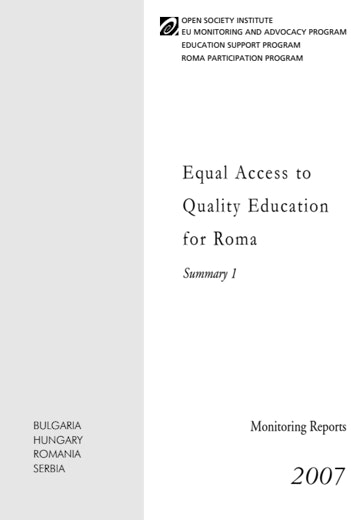Roma schoolchildren are often segregated from non-Roma children and face disadvantage in every aspect of their education. The governments participating in the Decade of Roma Inclusion 2005-2015 have set an ambitious course for themselves towards changing this situation. Yet in the first two years of the Decade they have scarcely found their bearings on the enormous task lying ahead. While policies and programs remain unfulfilled, Roma children continue to face discrimination, isolation, and exclusion.
These are the main findings included in this collection of monitoring reports by the Open Society's EU Monitoring and Advocacy Program (EUMAP), in cooperation with the Education Support Program and Roma Participation Program. The countries reviewed in this volume are Bulgaria, Hungary, Romania, and Serbia.
The reports paint an alarming picture: In Romania and Bulgaria, 15 percent of Roma children never enroll in the education system. For those who do enroll in school, the drop-out rates are 4 to 6 times higher than the national average. In Serbia the drop-out rate of Roma children is 15 times higher than national average. Roma children are shunted into segregated schools or classes where the quality of education received is invariably lower: lower standards in the curricula, poor human and material resources, low expectations of teachers, and classroom materials which often reflect prejudice.
The reports note that governments in the reviewed countries have energetically adopted policies and programs to improve education opportunities for Roma. In particular, National Action Plans were drafted in the framework of the Decade of Roma Inclusion, of which education is one of the main four focus areas. However, as highlighted by Mihai Surdu, Education Expert with the monitoring project, "even when problems of segregation have been identified, a comprehensive approach to the problem has not been initiated in any country."
Policy recommendations included in the reports address how governments can improve the ability of central and local structures to implement vital strategies. For example, they highlight the importance of pre-school education in ensuring equal chances to Roma children (only 16 percent of Roma children attend pre-school education in Bulgaria).
The complete reports and a summary are available for download.
Download
- Equal Access to Quality Education for Roma, Volume 1: Bulgaria, Hungary, Romania, Serbia (Executive Summary and Recommendations) (391.54 Kb pdf file)
-
Equal Access to Quality Education for Roma, Volume 1: Bulgaria, Hungary, Romania, Serbia (3.71 Mb pdf file)
Download the complete report.
-
Equal Access to Quality Education for Roma in Bulgaria: Bulgarian Translation (4.36 Mb pdf file)
Равен достъп на ромите до качествено образование: Преглед + Доклад за България
-
Equal Access to Quality Education for Roma in Hungary, Part 1: Hungarian Translation (996.2 Kb pdf file)
A Romák minôségi oktatáshoz való egyenlô mértékû hozzájutása: Magyarorszag, Országjelentés
-
Equal Access to Quality Education for Roma in Hungary, Part 2: Hungarian Translation (861.16 Kb pdf file)
A Romák minôségi oktatáshoz való egyenlô mértékû hozzájutása: Áttekintés
-
Equal Access to Quality Education for Roma in Romania, Part 1: Romanian Translation (2.82 Mb pdf file)
Acces egal la educaþie de calitate pentru romi: România
-
Equal Access to Quality Education for Roma in Romania, Part 2: Romanian Translation (688.54 Kb pdf file)
Acces egal la educaţie de calitate pentru romi: Privire generală
-
Equal Access to Quality Education for Roma in Serbia: Serbian Translation (820.25 Kb pdf file)
Jednaka dostupnost kvalitetnog obrazovanja za Rome u Srbiji
Read more
Voices In Depth
Inside the Archives: George Soros and the Fight for Roma Dignity

For over 40 years, George Soros has been the leading private supporter of Europe’s Roma—the continent’s largest and most excluded ethnic minority—championing Roma leaders in their fight for equality and against deep-rooted discrimination.
Roma Rights
A New Roma-led Vision of Power

The new, independent, Roma Foundation for Europe is backed by a €100 million pledge that builds on Open Society’s over 30 years of support for Roma causes.
Roma Rights
Q&A: A Step Toward Justice for Roma Women

In November, the Slovak Republic formally apologized to Roma women for a program of forced sterilizations that stretched out for decades. How a Slovak human rights group helped hold the government accountable.
